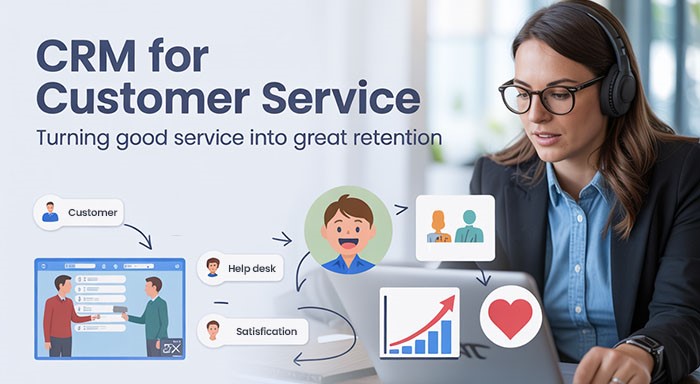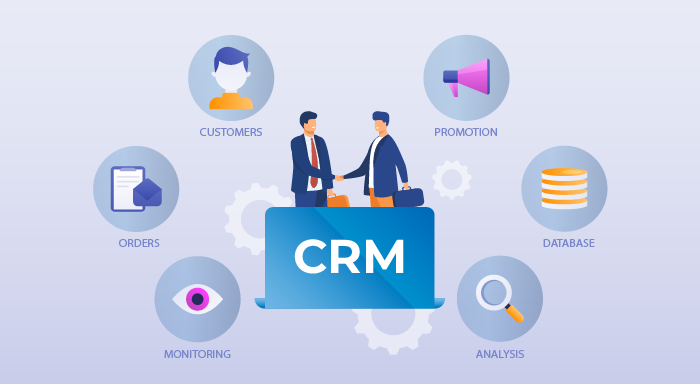Satisfied customers are the backbone of any business, irrespective of the industry. A good customer service can be the defining element that converts a curious visitor to a loyal customer. Every business should focus on providing an enhanced and personalized experience to their customers. This is where CRM systems play a part.
CRM (Customer Relationship Management) system is a tool that enables a business to manage their relationships with the customers throughout their interactive cycle. Including CRM in your customer service strategy can be the added advantage that you need to stand out among your competitors. In this blog, we will tell you how you can use CRM for customer services, the benefits of using it and some of the top CRM providers for you.
How CRM can Transform Customer Services
CRM offers you a platform to manage all the fragmented interactions that you have with your customers across multiple points, be it website, social media, phone calls, etc. Here is how CRM can streamline your customer service operations for improved services:
- Unified Customer Information
A CRM system provides you with a centralized comprehensive dashboard that gathers and stores information about your clients from all touchpoints. It unifies all communication channels, such as emails, phone calls, messages, and social media chats, in one interface. Having all the data readily available in one place would eliminate the need for your customer service team to access multiple databases whenever an issue arises. This would ensure that the service agent is well-informed about the customer history and has all the necessary information to provide a personalised solution. Customers’ issues would be resolved faster and to the utmost satisfaction.
- Collaboration and Communication
CRM systems break down the barriers between the different departments (operational and managerial) to act as a bridge connecting them all. Whenever a customer service executive needs information from another department, for example, sales, CRM facilitates direct communication through internal messaging, shared case notes or accessing the centralized database. This collaboration creates a functional ecosystem to support seamless escalation of issues and uninterrupted workflow, saving time and resources.
- Workflow Automation
Modern CRM systems use intelligent algorithms to automate repetitive tasks, eliminating the need for human intervention. This allows the executives to focus on customer problems without having to worry about menial tasks. Using CRM for customer services, the following tasks can be automated and managed:
- Ticket Routing and Queue Management – CRM can assess multiple factors such as issue type, workload distribution, etc., to assign cases to an available agent qualified to handle the case.
- Prioritization Tagging and Assessment – CRM uses urgency algorithms to ascertain the urgency of the issue, tag it and escalate it accordingly.
- Resolution Monitoring – CRM systems can monitor and track case progress until its resolved, ensuring that no customer issue gets overlooked.
- Scheduling Follow-Ups – CRM systems can be automated to trigger follow-up questions after customer interaction to collect feedback.
- Proactive Service
In traditional customer service methods, solutions were provided after an issue occurred and was reported. Today’s smart CRM systems can monitor customer behaviour, usage patterns, or satisfaction scores and use predictive analytics to identify potential issues before they arise. The customer service team can use this data to reach their customers in advance and prevent the issue from occurring. This proactive approach ensures complete customer satisfaction.
- Service Optimization
CRM system can provide insights about the performance of the customer service team. They can keep a track and provide comprehensive analytics on the key metrics like first-response time, resolution time, customer satisfaction scores, and agent productivity. Further, CRM systems can identify recurring issues that could indicate problems with the products or the services that your business provides. Using CRM for customer services, you can also get an idea about the service and staffing needs based on business cycles and historical patterns, aiding in resource planning and allocation.
- AI Integration and Personalization
AI-powered CRM systems can perform real-time analysis on large-scale data and customise the solutions to best fit the customer needs. AI uses LLM and machine learning algorithms to predict trends and customer sentiments based on customer preferences, purchase history, communication style, and past interactions. The service agents can use this data to personalize the customer experience and provide satisfactory resolutions. In this digital era, AI-powered CRM for customer services will empower your business.
When choosing a CRM system for yourself, some of the key factors to consider are:
- Business size, needs, goals and industry
- Technical capabilities
- Functions and features offered
- Finances and budget
- Ease of use
Instead of choosing the most popular or feature-rich option, it is better if you compare the CRM's strengths with your specific business needs.
To simplify your decision-making process, we have curated a list of the top 5 CRM providers for you:
Salesforce
Salesforce is a U.S. based CRM platform. With Amazon, Spotify, Toyota, American Express and many other big names from various industries as its clientele, it is the leading cloud-based CRM system provider.
Features:
- AI-Integrated CRM tools
- Customised products for customer service, sales, marketing and more
- Mobile-first approach for real-time access of data from anywhere
Pricing:
- Starter Suite - $25 per month
- Pro Suite - $100 per month
- Enterprise - $165 per month
- Unlimited - $330 per month
SugarCRM
With over 1M users across 120+ countries, this CRM system is one of the best out there.
Features:
- Offers automation, including call centre automation
- Provides mobile based approach
- Supports both cloud and on-premises implementation
Pricing:
- Essential - $19 per month
- Standard - $59 per month
- Advanced - $85 per month
- Premier - $135 per month
Microsoft Dynamics 365
Microsoft Dynamics is the most suitable CRM for businesses that already use the Microsoft ecosystem.
Features:
- Tools with built in AI-Integration (Microsoft Azure and Cortana)
- Powerful business intelligence and analytics
- Strong integration and collaboration with Outlook
- Mobile-first approach
Pricing:
Offers pricing based on Dynamic 365 applications
Zendesk
With over 10k customers, Zendesk provides service-focused products and solutions and is the most suitable CRM for customer services.
Features:
- Customer service oriented
- AI-integration and automation
- Mobile-based approach
Pricing:
- Support Team – $19 per month (annual subscription), $25 per month (monthly subscription)
- Suite Team – $55 per month (annual subscription), $69 per month (monthly subscription)
- Suite Professional – $115 per month (annual subscription), $149 per month (monthly subscription)
- Suite Enterprise – $169 per month (annual subscription), $219 per month (monthly subscription)
HubSpot
HubSpot is one of the best smart CRM platforms for small and medium enterprises.
Features
- AI-powered tools
- Live webchat
- All round approach with solutions for sales, marketing, services, content, etc.
- Automation
Pricing
It offers different pricing packs for sales, services, marketing, content, etc. It also offers separate pricing for small teams and medium enterprises, respectively.
Impact of Using CRM for Customer Service
The transformation in customer service due to CRM implementation delivers quantifiable results for a business. Some of these benefits are:
- Faster Response Times:
Automated queue management and routing combined with AI-assisted responses can produce a reduction in the initial response times by 40-60%. Priority assessment further aids in this. With an integrated data interface, agents can resolve issues faster and more efficiently. This saves time and money. Implementing a virtual queuing solution enhances this process by allowing customers to wait remotely, reducing congestion and improving overall satisfaction.
- Improved First-Call Resolution:
Readily accessible comprehensive customer data ensures that agents get a better understanding of the customer history and issue. This way they can solve more issues on the first interaction itself.
- Increased Customer Retention:
Proactive services and personalized experiences contribute to customer satisfaction and increased retention rates. Happy customers are loyal to the business and help in building a good reputation that new customers can trust.
- Reduced Service Costs:
Routine inquiries, follow-up scheduling, feedback collection and other repetitive tasks can be performed by automation. This saves time and human efforts, so, the executives could focus on complex issues and high-value interactions.
Conclusion
Using CRM for customer service has turned customer interactions into a competitive edge. Businesses have changed their approach towards customer services which has transformed from a simple contact and issue resolution management to personalized customer experience. With customer interactions spread across different platforms, modern CRM systems are the perfect solution to manage services operations and turn every new client into a loyal customer for life.
Author's BIO

With 15 years of experience in CRM, I specialize in developing plugins for SuiteCRM and SugarCRM. My notable creations include SuiteCRM Email to Lead, SuiteCRM BCC Archiver, and SugarCRM Mailchimp. My expertise lies in enhancing CRM functionalities to drive business efficiency and growth.
Additionally, I create content on YouTube, sharing insights and tutorials on CRM solutions to help businesses enhance their efficiency and growth.








